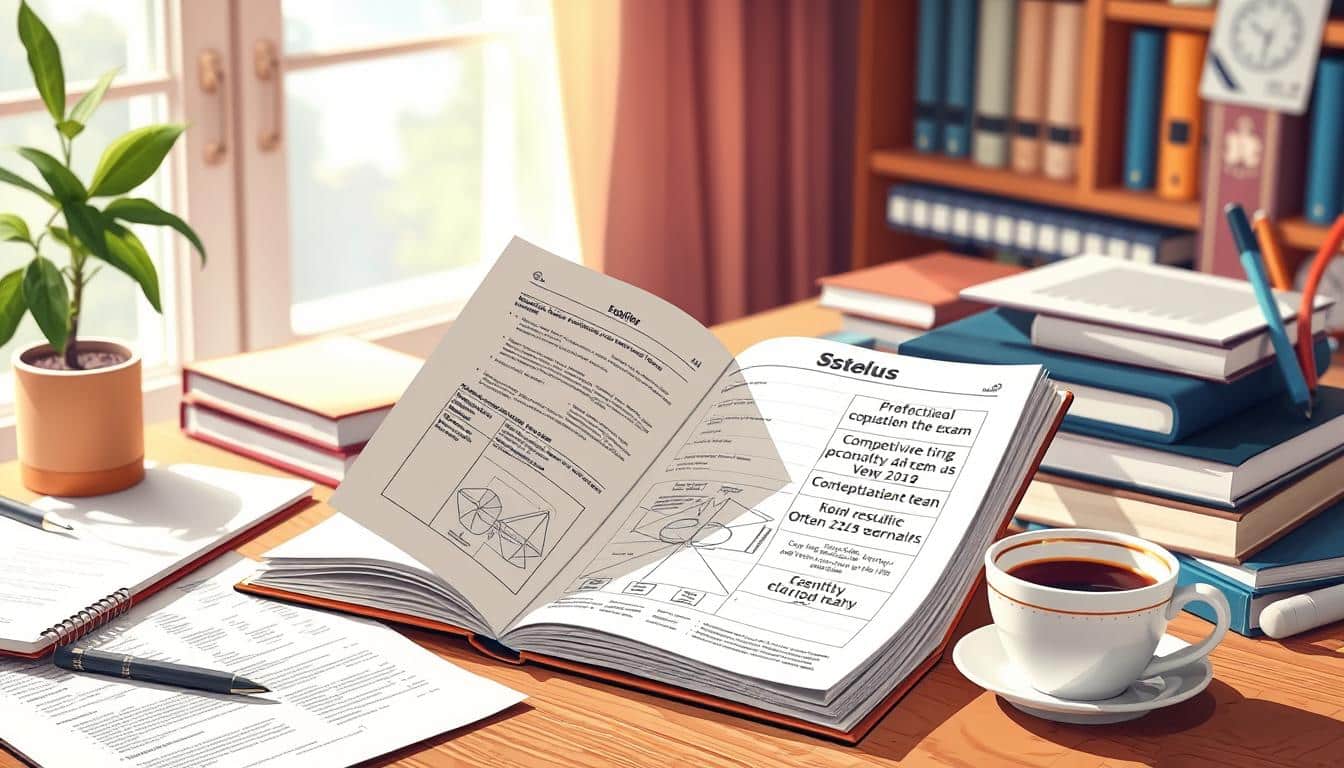Competitive exams are key in today’s education system. They open doors to great Competitive Exam Syllabus opportunities in many fields. In the United States, there are many exams that test a candidate’s skills and knowledge.
These exams are vital for getting into specialized fields. But, preparing for them can be tough. Students face big challenges like a huge syllabus, tight deadlines, and lots of competition.
That’s why a good study plan is so important. It helps guide students and boost their chances of doing well.
Key Takeaways
- Competitive exams are essential for accessing specialized fields and opportunities in the United States.
- The vast syllabus and high-pressure environment pose significant challenges for students preparing for these exams.
- A well-structured study plan is crucial for navigating the competitive exam landscape effectively.
- Familiarizing oneself with the exam format and syllabus can help in creating a targeted preparation strategy.
- Adopting a disciplined approach and utilizing diverse study resources can enhance the chances of success in competitive exams.
Understanding the Competitive Exam Syllabus
Getting to know the competitive exam syllabus and format is key to good preparation. It’s important to grasp the exam pattern, including the types of questions and total marks. Knowing the passing requirements and time limit for each section is also crucial.
Analyzing the Exam Format and Structure
Looking at previous year’s question papers and doing mock tests offers valuable insights. The official exam website is a great resource for all the necessary details.
Identifying Key Topics and Weightage
The exam syllabus spans many topics, like Number Systems, Algebra, Data Interpretation, and Logical Reasoning. It also includes Verbal Reasoning, General Awareness, and Current Affairs. Knowing the key topics and their weightage helps you focus your studies.
| Exam | Syllabus Coverage |
|---|---|
| Civil Services | Includes topics like Arithmetic, Algebra, Geometry, Data Interpretation, Verbal Reasoning, and General Awareness |
| Banking Exams | Focuses on Quantitative Aptitude, Reasoning, English Language, and General Awareness |
| GMAT | Covers Analytical Writing, Integrated Reasoning, Quantitative Reasoning, and Verbal Reasoning |
| GRE | Assesses Quantitative Reasoning, Verbal Reasoning, and Analytical Writing |
By deeply familiarizing yourself with the exam syllabus, format, and structure, you gain a clear understanding. This helps you plan your preparation effectively.
Creating an Effective Study Plan

Creating a solid study plan is key to acing exams. First, figure out your strengths and weaknesses in each subject. Then, spend more time on areas you struggle with. Also, make sure to review the subjects you’re good at.
Setting SMART Goals
Use the SMART (Specific, Measurable, Achievable, Relevant, and Time-bound) goal framework. It helps set realistic goals for your study schedule. This way, you can cover the whole syllabus well and efficiently.
Allocating Time for Subjects and Topics
Divide your study time into specific slots for each subject or topic. This ensures consistency and focus in your studies. Research shows that studying one hour a day for 20 days is better than studying 10 hours a day for two days before the test. Also, short study sessions over long periods improve cognitive performance more than long study sessions.
By making a personalized study plan that fits your strengths, weaknesses, and time management skills, you can prioritize, revise, and master the exam syllabus effectively.
| Statistic | Benefit |
|---|---|
| Preparation for an exam should ideally start five days in advance to solidify the material. | Allows for better retention and understanding of the subject matter. |
| Spending one hour studying each day for 20 days yields better exam results compared to studying for 10 hours daily for two days before the test. | Consistent, spaced-out study sessions lead to improved learning outcomes. |
| Cognitive performance is enhanced by working in brief blocks of time spread out over extended periods rather than in a few lengthy sessions. | Shorter, more frequent study sessions improve focus and retention. |
“Effective study plans are linked to higher academic success rates in exams and assessments.”
Utilizing Study Resources and Techniques

It’s important to have top-notch study materials for exam prep. Begin with textbooks suggested by the exam board. Then, add reference books for detailed explanations. Don’t forget coaching materials and practice tests for extra help.
Check out online resources like educational websites and platforms. They offer video lectures, detailed explanations, and practice tests. Try active learning techniques like highlighting and note-taking. Use spaced repetition, mind maps, and mnemonics to remember better.
Gathering High-Quality Study Materials
Begin with textbooks from the exam board. Then, add reference books for more details. If you can get coaching materials and practice tests, they’re a big plus.
Active Learning Strategies
Try active learning techniques like highlighting and note-taking. Use spaced repetition, mind maps, and mnemonics to remember better. Regularly solve practice problems and previous year’s question papers to check your knowledge and improve time management.
“Consistent practice and active engagement with study materials are key to excelling in competitive exams.”
By using a wide range of study resources and learning strategies, you can do well in your exams. Stay focused and distraction-free. Take breaks for revision to keep your mind sharp.
Competitive Exam Syllabus: Mastering the Content

To do well in a competitive exam, knowing the basics is key. Start by reviewing what you’ve learned before moving on. This helps you see what you need to work on more. Use active learning techniques like writing out ideas in your own words or making practice problems. This keeps your mind active and helps you remember better.
Make a note-taking system that works for you. It makes revising easier. Try mock tests and previous year’s question papers to see where you need to improve. Good time management, physical fitness, and a positive mindset also help keep your mind sharp and avoid burnout.
Use online tools like Khan Academy, Coursera, and edX to get extra help. Try out different study techniques to see what works best for you. This could be anything from practice tests to flashcards.
Being part of a study group can also help. It’s a chance to learn together and get new ideas. By mastering the exam syllabus and using smart study strategies, you can boost your chances of success.
Also Read : Mastering The IELTS Syllabus: Tips For Success On The Test
| Study Time per Day | Percentage of Students |
|---|---|
| Less than 2 hours | 50.5% |
| 3-4 hours | 34.4% |
| More than 5 hours | 15% |
“Mastering the competitive exam syllabus is not just about memorizing facts, but about understanding the fundamental concepts and applying them effectively.”
Conclusion
Preparing for a competitive exam needs a detailed and smart plan. Knowing the exam syllabus and making a study plan are key. Using top resources and learning techniques helps a lot.
Mastering the content is crucial. This way, you can turn exam fear into mastery. Success in exams comes from perseverance and dedication. With the right strategies and a positive attitude, you can reach your goals.
This guide’s main points are to be strategic, use study resources well, and focus on mastering the content. A balanced approach and strong dedication will help you succeed in these exams.
The path to exam mastery is tough, but with the right mindset and strategies, you can beat any hurdle. Seize this chance, stay focused, and let your perseverance lead you to success.
FAQs
Q: What is the importance of following the syllabus for competitive exams?
A: Following the syllabus for competitive exams is crucial as it helps candidates focus on important topics, understand the exam pattern, and manage their time effectively during preparation.
Q: How can I download the syllabus for quantitative aptitude?
A: You can download the syllabus for quantitative aptitude in PDF format from various educational websites or official exam portals that provide resources for upcoming government exams.
Q: What are some effective preparation tips for the general awareness section?
A: To prepare for the general awareness section, candidates should stay updated with current affairs, read newspapers daily, and refer to reliable study materials that cover the syllabus for general awareness comprehensively.
Q: What topics are covered in the English syllabus for competitive exams?
A: The English syllabus for competitive exams typically includes grammar rules, vocabulary, sentence comprehension, and various sections of general English questions such as prepositions, conjunctions, and tenses.
Q: How can I ace the English section in government exams?
A: To ace the English section in government exams, candidates should practice regularly, focus on grammar and vocabulary, and take mock tests to familiarize themselves with the exam pattern and types of questions asked.
Q: What is the exam pattern for SSC CGL and how does it affect preparation?
A: The exam pattern for SSC CGL includes multiple-choice questions divided into sections like quantitative aptitude, general awareness, and English. Understanding this pattern helps candidates prioritize their preparation and focus on areas where they need improvement.
Q: Why is it necessary to know the important topics in the syllabus for government exams?
A: Knowing the important topics in the syllabus for government exams allows candidates to allocate their study time wisely and ensures that they cover all areas that are likely to be tested in the examination.
Q: How to prepare for the upcoming competitive exams effectively?
A: To prepare effectively for upcoming competitive exams, candidates should create a study schedule based on the syllabus, practice previous years’ question papers, and focus on strengthening their weaknesses through targeted preparation.
Q: What resources can help candidates prepare for various competitive exams?
A: Candidates can utilize books, online courses, coaching classes, and study materials available in PDF format to enhance their preparation for various competitive exams. Turning to platforms like BYJU’S can also provide structured learning resources.
Q: How can I improve my score in the examination?
A: Improving your score in the examination involves consistent practice, reviewing the general English syllabus, focusing on quantitative aptitude, and regularly updating your knowledge in current affairs and general awareness.
